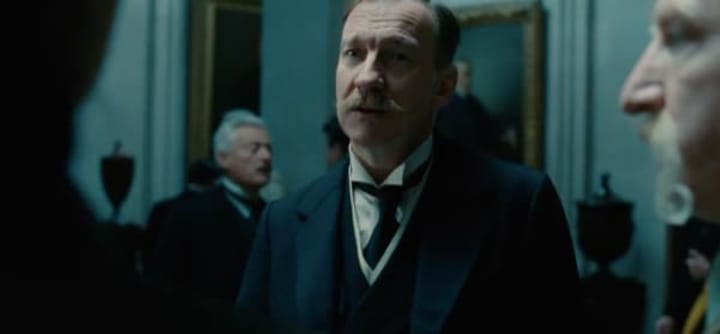Why Ares Is The Perfect Villain For 'Wonder Woman'
Say what you will about the burgeoning DCEU, but each installment has attempted to tackle mature and meaty themes through their respective villains.

Say what you will about the burgeoning DCEU, but each installment has attempted to tackle mature and meaty themes through their respective villains. For instance, Batman v Superman: Dawn of Justice examined xenophobia through Lex Luthor’s (Jesse Eisenberg) hatred of Superman. Man of Steel's General Zod (Michael Shannon) investigated the nature of power and extremism, and Wonder Woman does something similar with its own antagonist. Even though the film's depiction of Ares, the God of War, has divided fans somewhat, the choice to pit #GalGadot’s Diana against him was a brilliant one. In my opinion, the way this villain is handled is one of Wonder Woman's main strengths.
Warning! The Following Article Contains Major Spoilers For Wonder Woman!
Breaking Down The God Of War
The fundamentals are all in place for Ares to work well from the start. He may vary between ancient texts, but for the most part Ares appears as a handsome lover (and instigator) of conflict. He's also depicted as an irrational, brutal and overwhelmingly masculine figure. Certainly, in Wonder Woman, Hippolyta’s (Connie Nielsen) bedtime stories reveal that long ago, Ares came to believe that mankind was weak and unworthy, so he sought to corrupt and destroy Zeus’s prized creation. When the gods intervened, Ares murdered all of them, before he was grievously wounded in a final conflict with Zeus.
So when the film posits General Erich Ludendorf (Danny Huston) as his new disguise, it makes a lot of sense. After all, this fictional version of Ludendorf is a psychotic patriot who goes to vicious lengths to pursue a continuation of the war, and refuses to consider that Germany could actually lose. Obviously, this tallies with what we know of Ares; however, as Diana discovers when she attacks Ludendorf’s complex, the situation is not that simple.
In a surprising twist, Ares turns out to be the kindly British politician Sir Patrick Morgan (David Thewlis), who had been supporting Diana and Steve’s (#ChrisPine) insurgency, and who has been campaigning for the armistice. It might seem like a strange decision to cast Remus Lupin from the Harry Potter series as a warmongering god, especially when he seems to be advocating for peace, before he dons a huge suit of armor to do battle with our heroine. But it's a smart decision that ultimately pay off.
The Malice Of Patrick Morgan: Why The Twist In Wonder Woman Works

(Credit: Warner Bros.)
It may seem that Ares's true identity doesn't fit with his goal of total war, but as he explains to Diana in the German watchtower, Ares is pursuing the armistice in full knowledge that it won’t last, and that it will only provoke further escalation. Unfortunately, we know he is right. As history books tell us, the armistice didn’t bring a sustained peace — it only served to usher in the Treaty of Versailles, something which later helped the rise of the Nazis.
The Morgan/Ares revelation is not misguided, or a twist for the sake of one. Bumbling, limping and struggling to be heard in his first appearance, Morgan is an unlikely guise for the macho Ares, but that's the crucial point. All her life, Diana was told about the inherent goodness of men, so she begins her search for Ares, she’s looking for someone who is beyond humanity; an absolute evil opposite to humanity and herself. In similar way to how Diana is consistently seen as an everyday, lesser woman by the Allied generals, Ares is essentially indistinguishable in a crowded room of powerful white men. It’s a powerful statement that rams home the idea that there is never an absolute evil; morality is never that straightforward.
Indeed, Thewlis’s casting is also very significant here, as is Ares’s positioning as a British man. Brits may play the bad guys in many blockbusters, but in wartime epics and dramas, they are almost always on the side of good. Americans are similarly depicted in cinematic recreations of the Second World War. But in Wonder Woman, Chief (Eugene Brave Rock) significantly states that good guys like Steve were also responsible for the terrible ills of his people. The British may have triumphed in these wartime periods, but let’s not forget that in these eras, they also possessed an empire responsible for many atrocities. Therefore, the casting of the renowned actor David Thewlis as the villainous, very British-sounding Ares, as opposed to Danny Huston’s almost stereotypical German character, is a pointed move to further explore these complex ideas.
Because that is the crux of Ares; sure, he openly fights with Wonder Woman come the movie’s climax, but he is predominantly an ideological foe — and a potent one, at that.
Diana Vs Ares: Love Vs Hate
The confrontation between Ares and Wonder Woman is sure to be a firm favorite for #superhero fans for years to come. Calling himself the God of Truth, Ares relays some information that Diana finds hard to digest; the fact that he has only gently stoked humanity’s potential for violence is devastating to her, as is her realization that one big bad guy isn’t the root cause of their ills. During Diana's weakest moments, he uses Steve’s tragic death to illustrate the self-destructive nature of mankind, and tries to persuade her that humans are unworthy and need to be eradicated for a new paradise to flourish.
But Ares's extreme reasoning that they all must die does not hold water. After all, as the murderer of all the gods, he's no better than the evil humans he denounced, and Steve — a supposedly weak and venal human — was capable of such a loving sacrifice. Along with each realization she has had through her adventures, Diana rejects such severe reasoning and opts for nuance and compassion.
Maybe it was a little strange to see Thewlis's Ares “hulk” out, and perhaps he could have done without the period-accurate mustache in his final form, but these traits aren’t critically detrimental to his characterization. With chilling composure, surety and a fearsome intelligence, Ares remains as nebulous and changeable a presence as the dark impulses that he pushes humanity towards. He’s the shadowed “other” of Diana, and the catalyst for her renewed outlook and integrity.
Some fans have speculated that the film would have beeb better without him, and a villain-less end of Wonder Woman would be an undoubtedly powerful rumination on the darkness of human nature through the First World War. Yet this would be a bleak betrayal of the film's inherent optimism. Ares is needed as a focal point for a cynical take on morality, to help nudge Diana towards her hopeful brand of heroism.
Certainly, it’s a brilliant touch from #PattyJenkins that Ares is only defeated when Diana reflects his own hateful attack back at him; Ares’s lust for violence begets his own death, just as virtue only inspires more virtue. As such, this subtext only serves to reinforce the message that Wonder Woman herself repeats at the opening and close of her film.
“Only love can save the world.”
With the new Wonder Woman movie, Patty Jenkins’s task was to reintroduce moviegoers to Diana and show how she becomes the Wonder Woman we know and love. Given the ecstatic reception the film is enjoying, it seems that she succeeded, especially through the choice and execution of the film’s villain. After all, who better to help give an icon of female compassion and justice such a potent story than the misanthropic God of War himself?
About the Creator
Max Farrow
A fanatical film-watcher, hill-walker, aspiring author, freelance writer and biscuit connoisseur.
These articles first appeared on Movie Pilot between Jan 2016 and Dec 2017. Follow me on Twitter @Farrow91






Comments
There are no comments for this story
Be the first to respond and start the conversation.